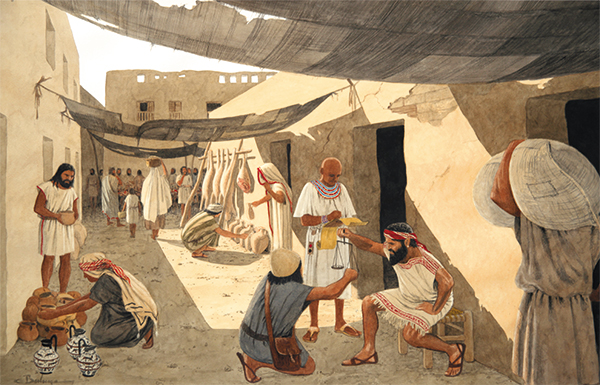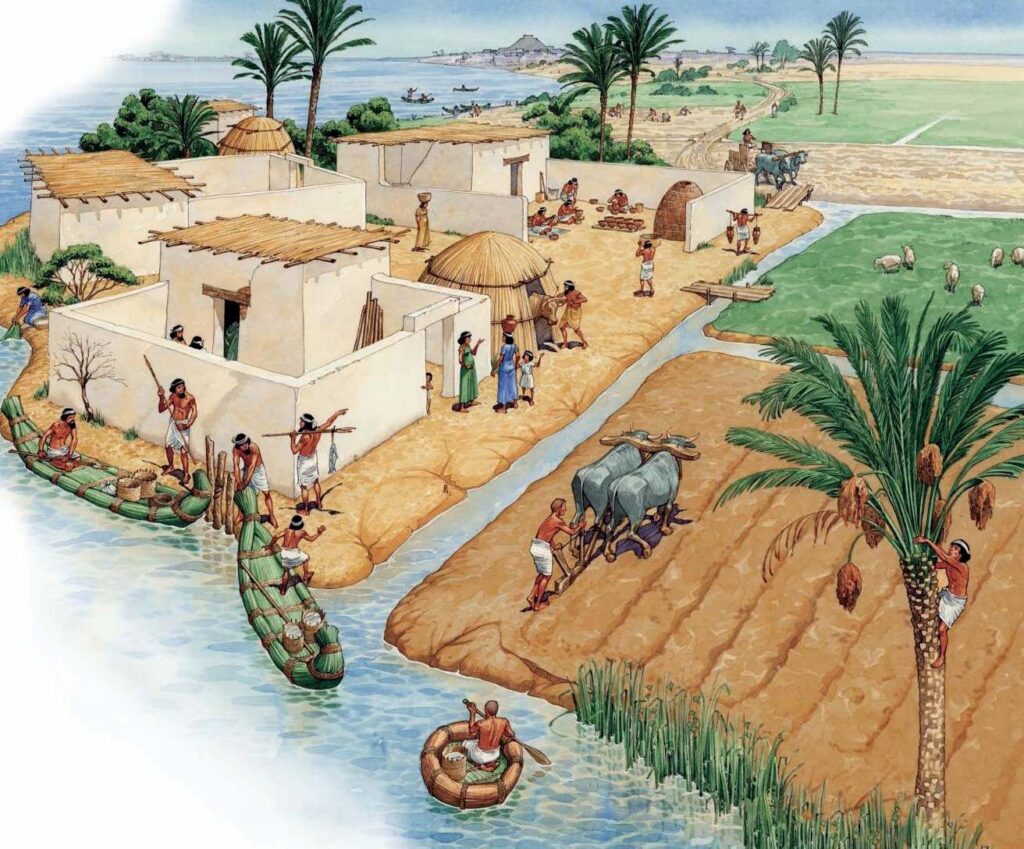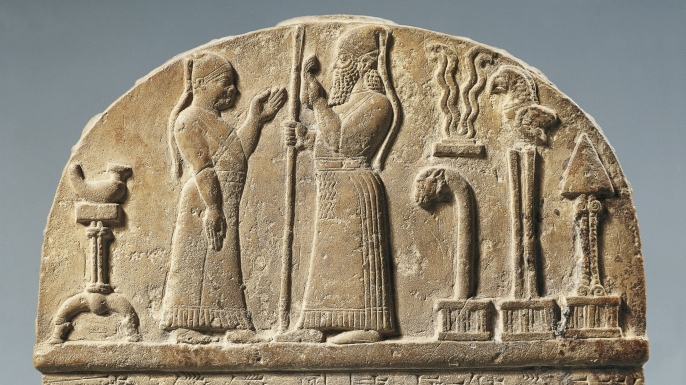Civilization
—Merriam Webster Dictionary
“a relatively high level of cultural and technological development, specifically the stage of cultural development at which writing and the keeping of written records is attained.”
Historians trace the origins of Western Civilization to ancient Mesopotamia and Egypt. These societies were empires and cities that transcended the face-to-face relations of tribal society. They contained thousands of people from many different families and tribes.
The existence of civilized society requires two things: production and social order.
Production: First, these societies must be able to produce food and services that eliminates natural scarcities faced by hunter-gatherers. Food production makes it possible for more people to live on a given territory. Herding of cattle and flocks, and the development of agriculture enabled human beings to have stable food supplies, and this provided the opportunity to divide labor into other activities like written language, trade, and shipbuilding .
Written language provided communication that transcended face-to-face communication and enabled the writing and transmission of the laws necessary for large impersonal society to function uniformly. Human beings are capable of developing a limited number of personal relationships. They can personal care for members of families and small tribes. The development of social institutions and the organization of more complex society requires written rules that apply to larger numbers of people in a city or empire. Laws treat people impersonally, whereas smaller personal society treats each person according specific situations and relationships.
Technologies like farming with irrigation systems in Mesopotamia or on flood plains in Egypt were labor intensive and, rather than being competitors, human beings could live better when they cooperated. Such cooperation was the basis for civilization and civilized behavior between people from different families. When a king or emperor conquered a foreign land, he did not have to put the inhabitants to death because of scare resources. He could put them to work for himself or allow them freedom to produce on their own and levy taxes in exchange for protection against invaders with his army.
A good king would collect a modest tax for protection of the citizens, who were allowed to freely exchange and sell their produce on an open market. A tyrant would own all the land and force people to work as serfs or slaves. In either case human beings were an asset to the economy. In an agrarian economy, large families were important because there were more hands to produce more crops. Hunter-gather societies had win-lose economies. The taker was the winner, and nature or another tribe was the loser. But economy production makes a win-win economy possible, creating more wealth for everyone to share.
It has been estimated that the earth could support about 10 million human beings if all are hunter-gatherers. One scientific report puts the earth’s population at 8,000 b.c.e., before the rise of civilizations, at about 5 million people, and that at 100 c.e. at the height of the Roman Empire, there were about 300 million people on earth. This 60-fold increase was largely made possible by an economy based on agricultural production and distribution.
From 4,000 b.c. to 2,000 b.c. the farming communities and towns in ancient Mesopotamia evolved from local rule, with military leaders fighting over control, to more centralized control. Laws, language, and bookkeeping developed, underpinning a productive economy. This civilization reached the height of its flowering under King Hammurabi (c. 1810 – c. 1750 b.c.), who engraved the legal code, known as the Hammurabi Code, on a stone stele that is on display in the Louvre in Paris. This code provides a look at the behavioral principles and boundaries that enabled the Babylonian society to flourish. Core commandments were later distilled by Moses in the Ten Commandments. These rules covered all aspects of life, from false accusations, to marriage and family, business, taxes, and slavery.
Most important for the development of civilization is laws protect people and their property. They prohibited killing and stealing. They punished corruption and cheating, which are forms of theft.
Babylon: The Hammurabi Code represents the first stage of governance in ancient civilization. I call this “Life, Liberty, and the Pursuit of Happiness, Version 1.0.” This is a society with a governance system based on the laws promulgated by a king, pharaoh, or emperor. The absolute power held by a king meant his laws could be arbitrary, capricious, or principled depending on his personality and skill. Hammurabi’s Code, however, was not something Hammurabi personally made up. It reflected the accumulated wisdom of Mesopotamia recorded by scribes in temples, businesses, and government going back at least to Sargon.
Governance
All three social spheres—government, economy, and culture–were under the absolute power of king, but scribes and intellectuals articulates rules in each social sphere. The king had scribes, but also businesses and temples had scribes, Activities and transactions were recorded on thousands of cuneiform tablets unearthed in the 19th and 20th centuries, they give a lot of information about Babylonian society.
Economy

Babylon allowed free enterprise within bounds. It protected the flourishing of free and fair markets. Scales were used to help prevent cheating on sacks of grain or precious metals. The Code outlined proper business relations and recompense and punishments for violations. Responsibility for one’s work was emphasized. A builder of a house that collapsed had to cover all damages. The manager of an irrigation dam that broke had to compensate all the farmers whose crops were damaged. Weights and measures were used for sales and cheating was punished. The economy involved slavery. Slaves were property of masters and forced to work, but their jobs could be any form of labor—from being a laborer in the fields to a literate scribe. Rules regarding slaves were complex because they could intermarry and share children and households with free people. However, their portion of household possessions went to their masters on their death, while the free spouse kept their portion and the children were free.
Culture
While the culture of Babylonia permeated everyone in society and was taught by parents to children in households and was reflected in the Code of Hammurabi. Temples were social institutions that performed the function of what we would today call the welfare state. Today we think of these temples simply religious, because of the deities and rituals associated with them. However, they were communes for care of the needy—widows, orphans, refugees, the sick, and the poor.
Temples often had large tracts of land that were farmed, producing food for residents and also sold in the neighboring cities for temple income. The farming was done by residents of the temples who could work and were trying to get independently established. Portions of the food were set aside “for the gods” and eventually, after a ceremony, got divided among the residents.
Temple residents also engaged in basket-weaving, silver-smithing, and other trades they learned in the temples. Their products were also sold in front of the temples. Residents could keep a portion of the proceeds and eventually, with adequate skills, move out of the temple into their own home. This “welfare-to-work” program provided an incentive for residents in a communal temple to eventually leave a life of dependence and pursue a happier life on their own.
Temples might not be fully self-supporting, and Hammurabi gave them donations and encouraged local officials to do the same, especially on feast days where such responsibilities were emphasized.
The Weaknesses of Ancient Empires
While many Ancient Empires were highly successful in providing better lives for their people than hunter-gather societies. They were at the mercy of the character and skill of the ruler, who could either be a tyrant or a benevolent administrator. In The Politics, Aristotle, writing over a thousand years after Hammurabi, provided some of the best commentary on government that exists to this day.
Ancient people tried and experienced many kinds of rule: kings, tyrants, democracies, and mobs. Some systems lasted over time and others failed quickly. The reasons for success or failure had less to do with their structure than their implementation by leaders.
- Did people voluntary serve and proclaim a leader, or did they seize power by force?
- Did leaders serve the interest of all the people?
- Did they use the people to serve themselves and cronies?
- Were leaders skilled and competent for the job?
In the Ancient World, monarchy was the most common form of government, The difference between a king and tyrant, was that a king served at the pleasure of the people, and the people served the pleasure of a tyrant. The same could be said for leaders of democracies or other constitutional forms of government. When leaders, regardless of the form of government, use the government for themselves rather than their citizens, they sow seeds of revolution.
The seeds of revolution in monarchies are similar to other forms of government; subjects attack their sovereigns out of fear or contempt, or because they have been unjustly treated by them. And of injustice, the most common form is insult, another is confiscation of property. In other words, the leader(s) are a “hunter-gatherers” rather than guiding production of goods and services for all. Regardless of the form of government, the growth and happiness of populations is heavily determined by whether its cultural foundations are based on taking or on production.
Also, regardless of the form of government power, the happiness of populations is heavily impacted by the moral orientation of the leadership, and whether it was motivated by agape love for all people, or personal interests in power and wealth.
The force of government power, the force of the economic market, and the force of love in the culture are all important and interrelated factors in civilizational evolution. While some times in Ancient Babylon, life could be pretty good when the three cultural spheres were well integrated, the most enduring and successful society in the ancient world in the Roman Empire.


